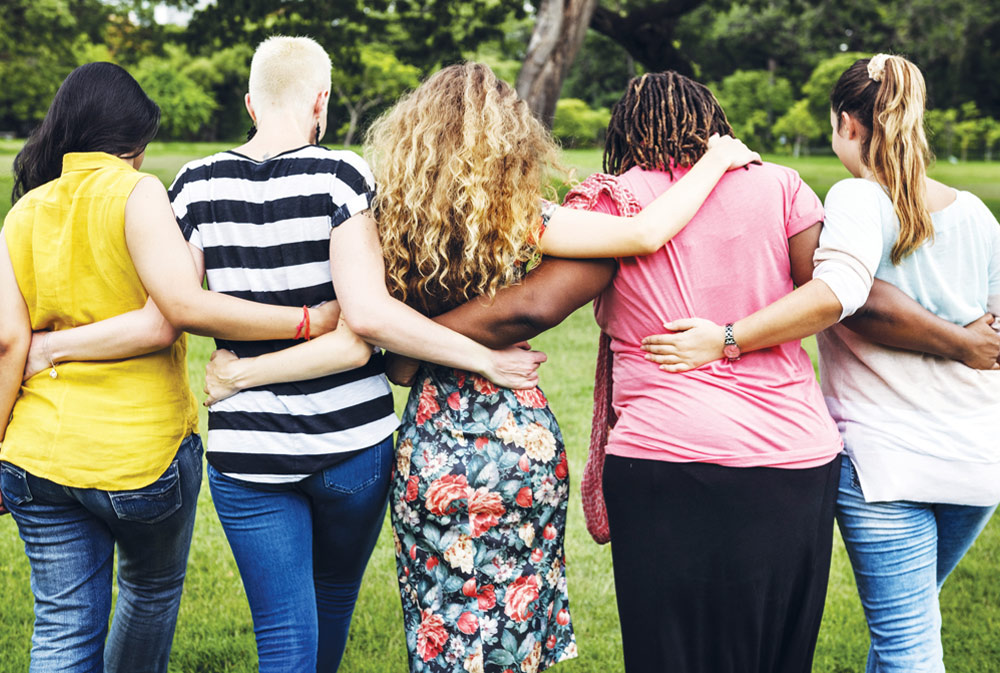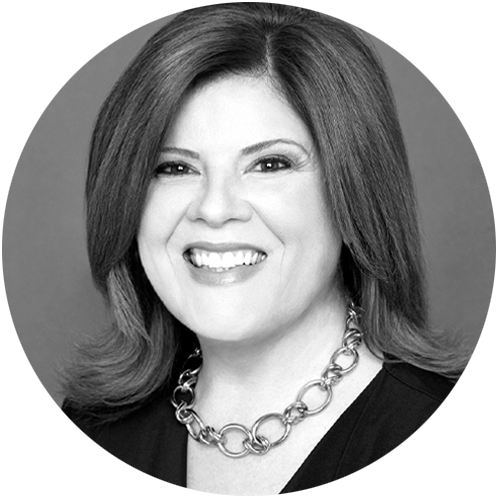Strength
Through
Trauma
ife can be hard. Brutal, sometimes, presenting challenges that can feel overwhelming. But it is often the darkest of times that reveal personal resiliency, inspiration and the ability of the human spirit to exhibit grace under fire.
Within the past three years, my 10-year-old son died of cancer, my mother and my best friend from college passed away, I lost a job I loved after eight years, and my husband and I divorced after 20 years of marriage.
Individually, any one of these circumstances might have set me back or forced a significant internal retreat, but instead I have emerged stronger. Not only am I still standing, I am thriving, thanks to an immensely strong network of women and a depth of fortitude I didn’t realize I had until I needed it.
You can let trauma crush you. Or you can seize it as an opportunity to grow. You have to commit to growth and then stay on that path.
My son had a grand mal seizure on an ordinary April morning in 2016. We were living in Alaska at the time. At first, they said he had encephalitis but were unsure what caused it.
When his condition deteriorated and he started losing his ability to walk, they performed a brain biopsy and diagnosed him with cancer. The type of cancer was originally misdiagnosed but later corrected when we moved back to Houston. Not that it mattered – both were rare and terminal.
My family lived through 14 months of “anticipatory grief,” knowing his death was imminent. Nothing is more sobering than a terminal illness. Naturally, I was unprepared for this on every level. Trying desperately to find a way to endure this horrible circumstance, I began to read intensely, mostly about the dying process, which I learned is actually part of the life process.
The best personal account I read said, “My son’s death made me a better person.” I made up my mind to strive toward this goal of becoming a better version of myself. Did I falter? Yes. Did I re-examine my life and behaviors? Also yes, and then I got back on that path of mindfulness.
When my best friend from college was dying of cancer, she was serene, thoughtful and faithful. From her, I learned grace, something I lacked most of my life. I could be brusque, sharp, too direct. I spent my adulthood like a bull in a china shop. I used to be cynical, angry and defensive before I faced all these challenges. It’s like life took me by the shoulders and shook me.
My friend’s unwavering dignity in the face of death humbled and shamed me. If she could exhibit such grace knowing her death was imminent, who was I to hold on to my posturing? Letting go of the resistive nature I had clung to was an overwhelming release. I regretted not doing it earlier.
My mother was 82 when she died. A battle axe of a woman, she did not suffer fools and raised her only child to be the same way. She was formidable, a force to be reckoned with when she felt wronged. She was fierce and unafraid.
As an only child, I credit her with teaching me independence and self-reliance. I still needed her when she passed (we all need our mothers), but I took comfort in the realization she knew she had done her job well as a parent.
In April 2019, I was on a business trip, working in the Wyoming office, when a Facebook message flashed on my personal phone: “Mrs. Jordan, I need to speak to you about your husband and my wife.”

My mind went blank from confusion and my heart raced. When I clicked open the message, it included pictures. The sender was the other woman’s husband. He had hired a private investigator. There was no question my husband was having an affair with this man’s wife.
The sender apologized for being the bearer of bad news but felt I needed to know. I thanked him – thanked him! – and tried to go about the rest of my day as if nothing had happened.
Like a lot of women, I suspected this was going on. I even suspected who because he kept bringing up her name – a telltale sign. But he always denied it.
Back in my hotel room, I had a brief phone conversation with my husband, who was a stay-at-home dad. I told him he needed to find a job and a place to live, but he refused to leave the house.
What followed was an agonizing 10 months of negotiations, arguments and trying to keep my other son from more emotional scarring. I had my moments shouting, “How could he do this to me?”
Perhaps the affair was his way of dealing with our son’s death. It is difficult to be supportive of one another when you’re both grieving so deeply, and perhaps I underestimated my husband’s ability to deal with such a life-altering event. To be honest, the reason didn’t matter. Most marriages do not survive the death of a child, though I had hoped ours would be the outlier. One study shows that up to 80 percent of marriages do not survive such an event.
For survival, my focus had to be on my own well-being and that of my son’s. Putting myself first is hard, as it is for most women. I am of no use to anyone if I’m not physically, emotionally and mentally healthy. It feels selfish and indulgent sometimes, and these are two things we shrink from as women because we’re taught to put others first.
But my traumas were so great, there is absolutely no way I could have survived without focusing on myself. How did I do that? I allowed myself to feel everything grief brings with it. It was scary and deep, sometimes so deep I couldn’t see the light anymore. But grief will have its way, so I found it was best to let it be free.
Throughout all of the trauma, my work had been there and remained a lifeline when everything else was falling away. I am honestly a better professional now. I am more focused and sharp, more understanding and collaborative, more empathetic.
Again, all that defensiveness and anger is gone, which cleared the way to allow more calm, more peace. That peace passes through every part of my life now. The losses I’ve experienced have brought a level of understanding that probably couldn’t have been achieved otherwise. Staying on my path toward becoming a better person was my lifeline.
I still caught glimpses of my old path, one of bitterness and anger. I definitely experienced those emotions but, recognizing them as toxic, I purposefully chose to forsake them in favor of grace.
Resiliency is one of the most important qualities to cultivate during challenging times. Its definition is “the capacity to recover quickly from difficulties; toughness.” Resilience is adaptation. One must shift with the challenging life event or risk getting consumed or run over by it.
A hallmark of resilience is having good connections and relying on good relationships. People want to help, so let them. When my life was falling apart due to my son’s illness, a friend spoke with me about all the people who wanted to help. “Give them a job,” she said. “They feel helpless.”
The last thing I wanted to do was be responsible for giving other people assignments related to my situation. Nevertheless, I doled out some duties: making meals for the family, taking my other son on outings, minding my sick son while I ran errands, and so forth. I didn’t realize it at the time, but as I was helping them help me, I was helping to heal myself, too.
I have always had a large group of friends from many walks of life – different generations, different income levels, different professions, different parts of the world. Being a natural extrovert, I nurtured these connections as a habit even in the best of times. Never did I expect I would need to rely so heavily on these relationships for support. They proved to be a safety net, catching me time and time again whenever I stumbled. I am forever grateful and indebted to these women. They felt the pain of my son’s death as well, but powered through to stand strong for me. They were almost like a shield, protecting me from the further scarring of what I was experiencing.
I can honestly say I would not be here today without them. The past three years have tested my resolve, my very will to live, and yet I’m still here, grateful.
Everyone’s journey through trauma is different, but for me the keys to survival were mindfulness, focusing on self, and relying on my network. This included therapists and doctors who helped me throughout this journey. Did I seek professional help? You better believe it. I urge anyone out there who is dealing with something larger than themselves to get all the help they can. You don’t have to carry this yourself.
In the television series “Shameless,” there’s a scene in which the lead character stands on the shore of Lake Michigan and shouts, “Is that all you’ve got?” I can relate to that. After enduring the deaths of my child, my mother, my friend, my marriage, and my job, here I am, fighting another day and shouting “Is that all you’ve got?”
